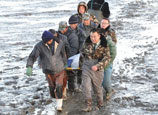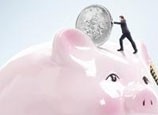
Ma Jun, chief economist at Deutsche Bank AG in China, said to free interest rates, the first step should be to set up a deposit insurance system, then to loosen the upper limits for deposit rates.
"I hope to see both upper limits for deposit rates and lower limits for lending rates removed in two or three years," he said, adding that bank rates could later peg to a seven-day policy rate.
President Hu Jintao said earlier this month in his report to the 18th National Congress of the ruling Communist Party of China that China will continue to promote market-oriented reform of interest rates, as well as the exchange rate of the yuan, and gradually realize the currency's convertibility under the capital account.
Peng Wensheng, chief economist and managing director of China International Capital Corp Ltd, said the recent appreciation of the yuan shows the central bank's currency policy has changed, with more flexibility and less intervention in the market.
"Actually there is no big flood of capital inflows."
But Pang added that increasing, policy flexibility doesn't necessarily indicate there is progress for exchange rate reform."There would be no major breakthrough as long as there are limited market players and a market not 'deep' enough, in which short-term capital flows could lead to greater fluctuations," he said. "The most substantial change should be opening the capital account and allowing various participants to enter the market."
He said the yuan's strong appreciation will not be sustained next year, as long as there are no major capital inflows.
wangxiaotian@chinadaily.com.cn















 Memorial service held for China's fighter jet production head
Memorial service held for China's fighter jet production head


![]()
